
Harvey Bernard Milk was an American politician and the first openly gay man to be elected to public office in California, as a member of the San Francisco Board of Supervisors.

The Castro Theatre is a historic movie palace in the Castro District of San Francisco, California. The venue became San Francisco Historic Landmark #100 in September 1976. Located at 429 Castro Street, it was built in 1922 with a California Churrigueresque façade that pays homage—in its great arched central window surmounted by a scrolling pediment framing a niche—to the basilica of Mission Dolores nearby. Its designer, Timothy L. Pflueger, also designed Oakland's Paramount Theater and other movie theaters in California during that period. The theater has more than 1,400 seats.

The White Night riots were a series of violent events sparked by an announcement of a lenient sentencing of Dan White for the assassinations of George Moscone, the mayor of San Francisco, and of Harvey Milk, a member of the city's Board of Supervisors who was one of the first openly gay elected officials in the United States. The events took place on the night of May 21, 1979, in San Francisco. Earlier that day White had been convicted of voluntary manslaughter, the lightest possible conviction for his actions. The lesser conviction outraged the city's gay community, setting off the most violent reaction by gay Americans since the 1969 Stonewall riots in New York City.
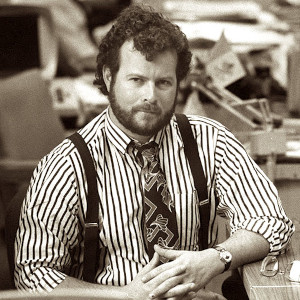
Randy Shilts was an American journalist and author. After studying journalism at the University of Oregon, Shilts began working as a reporter for both The Advocate and the San Francisco Chronicle, as well as for San Francisco Bay Area television stations. In the 1980s, he was noted for being the first openly gay reporter for the San Francisco Chronicle.
Crawford Barton was an American photographer. His work is known for documenting the blooming of the openly gay culture in San Francisco from the late 1960s into the 1980s.

Anne Kronenberg is an American political administrator and LGBT rights activist. She is best known for being Harvey Milk's campaign manager during his historic San Francisco Board of Supervisors campaign in 1977 and his aide as he held that office until he and mayor George Moscone were assassinated. As an openly lesbian political activist, Kronenberg was noted for her instrumental role in the gay rights movement, both for Milk's campaign and in her own right.
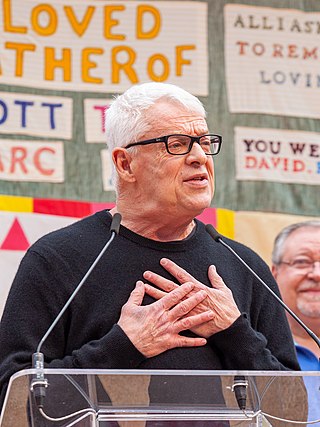
Cleve Jones is an American AIDS and LGBT rights activist. He conceived the NAMES Project AIDS Memorial Quilt, which has become, at 54 tons, the world's largest piece of community folk art as of 2020. In 1983 at the onset of the AIDS pandemic, Jones co-founded the San Francisco AIDS Foundation, which has grown into one of the largest and most influential advocacy organizations empowering people with AIDS in the United States.

The San Francisco Gay Men's Chorus (SFGMC) is the world's first openly gay chorus, one of the world's largest male choruses and the group most often credited with creating the LGBT choral movement.
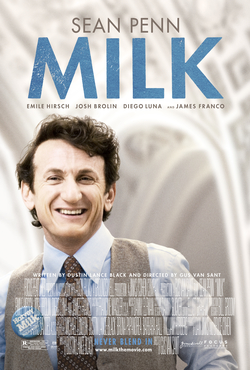
Milk is a 2008 American biographical drama film based on the life of gay rights activist and politician Harvey Milk, who was the first openly gay man to be elected to public office in California, as a member of the San Francisco Board of Supervisors. Directed by Gus Van Sant and written by Dustin Lance Black, the film stars Sean Penn as Milk, Josh Brolin as Dan White, a city supervisor, and Victor Garber as San Francisco Mayor George Moscone.
Jack Curtis Dubowsky is an American composer and author who has composed music for film, chorus, and concert performance. His music has been performed by the San Francisco Choral Artists, the Lesbian/Gay Chorus of San Francisco, Elevate Ensemble, and others.

Dustin Lance Black is an American screenwriter, director, producer, and LGBT rights activist. He is known for writing the film Milk, for which he won the Oscar for best original screenplay in 2009. He has also subsequently written the screenplays for the film J. Edgar and the 2022 crime miniseries Under the Banner of Heaven.
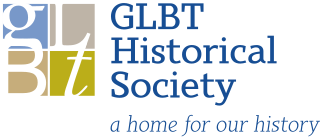
The GLBT Historical Society maintains an extensive collection of archival materials, artifacts and graphic arts relating to the history of LGBTQ people in the United States, with a focus on the LGBT communities of San Francisco and Northern California.
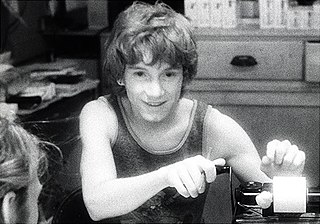
Daniel Nicoletta is an Italian-American photographer, photojournalist and gay rights activist.

Joseph Scott Smith was a gay rights activist best known for his romantic relationship with Harvey Milk, for whom he was a campaign manager.

Anne Kronenberg is an American political administrator and LGBT rights activist. She is best known for being Harvey Milk's campaign manager during his historic San Francisco Board of Supervisors campaign in 1977 and his aide as he held that office until he and mayor George Moscone were assassinated. As an openly lesbian political activist, Kronenberg was noted for her instrumental role in the gay rights movement, both for Milk's campaign and in her own right.

Marc Huestis is an American filmmaker, camp impresario and social activist. He is best known for his motion picture Sex Is... and his in-person tributes/benefit events feting celebrities from Hollywood's Golden Age and cult personas at San Francisco's Castro Theatre.

The Harvey Milk Foundation was founded in 2009 by Harvey Milk's nephew, Stuart Milk, and Harvey's campaign manager and political aide, Anne Kronenberg, based on discussions held with the family and close Harvey Milk allies after Stuart received the Presidential Medal of Freedom earlier that year. The organization continues to be headed by Stuart Milk and Anne Kronenberg and operates on a small, mostly private donor based, budget.

The lesbian, gay, bisexual and transgender (LGBTQ) community in San Francisco is one of the largest and most prominent LGBT communities in the United States, and is one of the most important in the history of American LGBT rights and activism alongside New York City. The city itself has been described as "the original 'gay-friendly city'". LGBT culture is also active within companies that are based in Silicon Valley, which is located within the southern San Francisco Bay Area.

The Castro District, commonly referred to as the Castro, is a neighborhood in Eureka Valley in San Francisco. The Castro was one of the first gay neighborhoods in the United States. Having transformed from a working-class neighborhood through the 1960s and 1970s, the Castro remains one of the most prominent symbols of lesbian, gay, bisexual, and transgender (LGBTQ) activism and events in the world.

Jim Rivaldo was an American political consultant. A gay man, he worked with Harvey Milk on his political activism and campaigns for San Francisco Board of Supervisors. Rivaldo consulted several political campaigns in San Francisco, including Kamala Harris's 2003 campaign for San Francisco District Attorney.




















